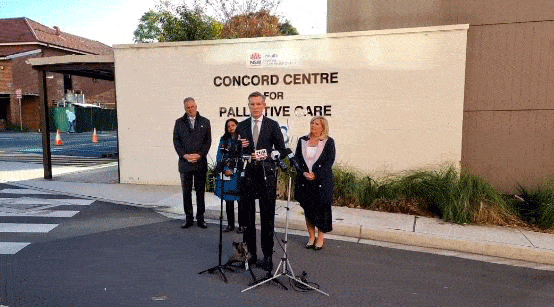
Palliative care experts have welcomed the state government’s plans to boost the sector with an additional $743 million in funding over the next five years, highlighting some of the work that needs to be done to ensure quality end-of-life care is available to all.
Premier Dominic Perrottet announced the package in the lead up to the state budget which comes on top of the $300 million per year already allotted by the government to palliative care.
It will include an extra 600 nurses, allied health professionals, doctors and support staff, and boost hospital capacity for palliative care as well as support for people who wish to remain in their home at the end of life.
Catholic Health Australia welcomed the news, saying that the lack of universal access to quality palliative care services in NSW was made apparent in the recent debate surrounding assisted suicide legislation.
“Underfunding of palliative care is a problem around the country, not just in NSW. We commend the Premier in doing something to address this in NSW,” said CHA Health Policy Director Caitlin O’Dea in a statement.
“Our members will particularly welcome the news that this funding boost will support those who wish to die at home with the best possible care.
“CHA will continue to lobby governments for more funding and to educate legislators of the benefits of palliative care and the advances that are being made in pain mitigation techniques.”

Linda Hansen, CEO of Palliative Care NSW told The Catholic Weekly that the peak body was “very pleased” to see that the promised additional funding announcement covered almost everything it has included in its budget submissions each year.
“We’ve been working with NSW Health for many years advocating for exactly these sorts of things,” Ms Hansen said.
“We’re also concerned that there be a proper balance of funding across a range of areas, so for example with increased staffing will there also be increased allocations to community palliative care, in-hospital palliative care and allied health? We’d love to have a conversation about what’s required when we get more detail about what the funding is being allocated to.
“We’re also keen to contribute to a way of identifying those people who can form the additional 600 staff, for instance people who are already in the health sector who may be interested in upskilling or retraining or changing the focus of their career towards palliative care.
“Underfunding of palliative care is a problem around the country, not just in NSW. We commend the Premier in doing something to address this in NSW” – CHA Health Policy Director Caitlin O’Dea
“There also are areas of palliative care that don’t receive as much attention, for instance we’d like to see more investment in getting volunteers back to the workforce after COVID, [NSW] Ambulance has a role to play in palliative care too and so we’d like to see some more focus on key funding there as well.”
Palliative medicine specialist Dr Richard Chye said that while the extra funding would be useful, he was interested in how the extra support staff would be provided in an environment where there are already shortages across the health system that are hard to fill. He said he would also like to see enhanced training of new palliative care professionals and a level of training mandated for all doctors and nurses, including GPs.
“Palliative care is not just specialist care, it’s everybody’s business. So how do we ensure that every doctor and nurse is able to provide palliative care when specialist palliative care services are not available,” he said.
“We also need to see a workforce plan; if we don’t know where the vacancies and needs are hopefully NSW Health will provide that detail.”
Sydney palliative care practitioner Dr Frank Brennan welcomed the promised funding boost “for services that do need more support both metropolitan and regional and remote in this state”.
Mr Perrottet said the government’s commitment was about “providing the greatest possible comfort and dignity to people who are at the end of their life, whether that’s in hospital, at home or in the wider community, right across the state”
“The sign of any just society is how we look after the most vulnerable and for too long in this state we have not provided the care and support for those who are coming to the end of their life. I want to make sure that in our state, we have not just the best palliative care services in the country but the world.”
The package includes $650 million over five years to boost hospital capacity and implement best-practice models for supportive and palliative care, improve access to pain management services for patients with life-limiting illness, and services for people with late-stage illnesses and conditions, and strengthen outpatient and community health services.
A further $93 million will be used to redevelop and refurbish NSW Health facilities, including new palliative care units at Westmead Hospital and Nepean Hospital.
The announcement comes a month after the passing of the state’s voluntary assisted dying law. During the parliamentary debate on the legislation the Premier opposed VAD and promised to provide better palliative care resources for people at the end of life.
